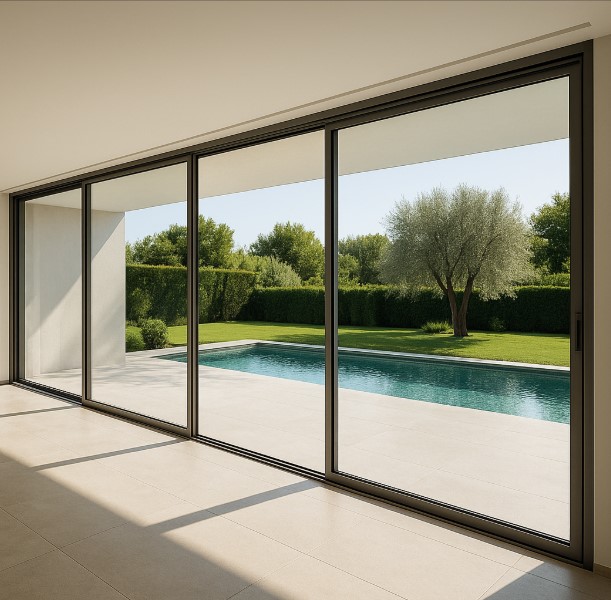Choosing the right aluminium windows

Let’s face it — aluminium windows are an expensive investment, but they are worth the price. Why? Foremost, these windows are more durable, can withstand larger dimensions and loads, and are easier to maintain. So what are the key aspects when choosing aluminium windows?
After reading this article you will know:
- What to consider when choosing aluminium windows
- Why it is worth investing in aluminium windows
- What is the difference between the selected Aluprof window systems
What to look out for when choosing aluminium windows?
- price and reliability of the supplier
- thermal insulation
- height of the frame and sash
- maximum dimensions and loads
Price and reliability of the supplier
There is no need to deny it — for customers, the right price is one of the most important aspects when acquiring goods. Aluminium windows can be two times more expensive than for example PVC models, you have to find a reliable supplier. Choosing the wrong provider may lead to a variety of problems, ranging from delays to unsatisfactory quality. The second matter is the huge price difference for the same window systems between various fenestration suppliers, as they can fluctuate up to several dozen percent.
debesto works only with credible factories, additionally, we constantly monitor the fenestration market in Poland, thanks to this, you can be sure that by entrusting us with your order, you do not overpay for the purchased goods, and their quality will be at the highest level.
Our company also offers you free project consultations that will help you manage your budget and dispel doubts related to e.g. local construction requirements.
Thermal insulation
In the beginning, let’s establish that the more insulation, the warmer the window is. But it should be remembered, that panes have the greatest impact on the U-Factor, since they occupy the largest area of the window.
*U-Factor — parameter of the thermal insulation value of the window
In terms of thermal insulation, aluminium windows can be divided into cold and warm windows.
Cold profiles do not have thermal insulation inside the frames and are dedicated to the internal building only.
On the other side, warm aluminium profiles have thermal spacers that are usually made of polyamide or foam. You can also add additional spacers, which also improves their thermal properties.

| “Cold” profile | “Warm” profile | |
| Window system | Aluprof MB-45 | Aluprof MB-79N |
| Thermal spacers | NO | YES |
| Glazing | 2 panes (Ug 1,0) | 2 panes (Ug 1,0) |
| U-Factor of the selected window* | 0.44 BTU/ft2 | 0.23 BTU/ft2 |
*selected window RU 1230 x 1480 mm, 2 panes (Ug 1,0), warm inter-pane frames
Height of the frame and sash assembly
The height of the frame and sash assembly is another element that affects the window thermals — the lower the fold, the larger the glass area, which is why narrow-frame profiles have been gaining popularity recently.
This trend awakened the rivalry between aluminium joinery producers that compete in creating systems with the lowest possible folding of the frame with the sash, which also allow as much light as possible to enter the room. Another advantage of the standard profiles with low folding is the slightly lower price of the windows, since the material consumption is lower.

From an aesthetic point of view, you have to remember that the larger the dimensions of the structure with the sash are, the higher the folding height can be — this is related to the maximum loads that a given sash and fitting can have. With larger constructions, however, the differences in the height of the assemblies are not that noticeable.
Allowed dimensions and loads
Each window system has its own maximum dimensions and load — this is another parameter that determines which system you should choose for your investment, for instance, if you want a 3-meter entrance, without the need to divide the structure into a lower sash and transom, the number of available options becomes significantly lower. But fret not — debesto’s technical consultants will help you choose solutions that meet your needs.
Aluminium windows – are they worth investing in? What are the advantages of aluminium joinery?
The strengths and advantages of aluminium windows include, for example,
- being more resistant to weather conditions and scratches, for that reason, aluminium windows can remain in an unchanging state for several dozen year
- it can withstand heavier loads, for instance, the longest acceptable side of the window in PVC is approx. 3 meters, in aluminium it can be as much as approx. 4 meters
- they do not require additional care like constructions made from wood
- thanks to varnishing, such profiles are more durable than veneered PVC profiles, you can choose from various options for finishing the structure, e.g. it can be wood-like, matte, glossy or with a fine sand texture
- aluminium profiles can be covered with all colors from the RAL palette, they can also be two-colored – a different tint and finish from the inside and outside
And what if you do not want to pay more for aluminium windows, but you care about their aesthetic aspects? Even when you have a limited budget, there are now more and more PVC systems on the market that imitate aluminium profiles. One of them is, for example, Gealan Linear.
Comparison of aluminium windows based on selected Aluprof profiles
Based on individual Aluprof window systems, let’s analyze the differences between cheap “warm” profiles, energy-saving models and passive aluminium windows, which are characterized by a low heat transfer coefficient. We will also learn what effect additional thermal insulators actually have on the overall thermals.
| PROFILE | GLAZING | PRICE OF THE SELECTED WINDOW* | U-FACTOR OF THE SELECTED WINDOW | MINIMAL FOLDING** |
| MB-70 ST | 3 panes (48 mm) | 493 EUR | 0.17 | 93 mm |
| MB-70 HI | 3 panes (48 mm) | 512 EUR | 0.17 | 93 mm |
| MB-79N ST | 3 panes (48 mm) | 471 EUR | 0.16 | 97 mm |
| MB-79N SI | 3 panes (48 mm) | 492 EUR | 0.14 | 97 mm |
| MB-86 ST | 3 panes (48 mm) | 537 EUR | 0.14 | 97 mm |
| MB-86 SI | 3 panes (48 mm) | 545 EUR | 0.15 | 97 mm |
| MB-86 AERO | 3 panes (48 mm) | 624 EUR | 0.14 | 97 mm |
| MB-104 Passive | 3 panes (48 mm) | 650 EUR | 0.13 | 103 mm |
*selected window RU 1230 x 1480 mm, RAL 7016, 3 szyby 48 mm (Ug 0.5), warm frame, aluminium handle, fitting anchors
**without extra charge from a proven manufacturer
ST = standard, HI/SI/AERO = additional thermal insulators
Based on the table above, we can find out that:
Aluprof MB-79N Standard:
- is about 5% cheaper than its older version MB-70 ST
- is based on the MB-70, it looks almost the same from the outside, but has better thermals and a slightly higher minimum folding of the frame with the sash at no extra charge
- this model can achieve an even lower fold, which is 90 mm, by changing the hinges from visible to hidden for an additional cost
- has the same U-Factor parameter as MB-70 with an additional HI insulator, but it is cheaper by approx. 8%
- with an additional SI thermal spacer, this profile is a good, cheaper alternative to the standard MB-86 version
MB-104 Passive:
- is a good option when you are looking for a window with good thermal parameters, corresponding to passive windows
- although it is more expensive than the MB-86 AERO by about 4%, its U-Factor parameter improves notably
- has a higher fold which is already over 100 mm
You should remember that passive systems require a different assembly than standard window systems, but we will talk about it in a separate article.
Apaft from Aluprof products, debesto also offers products from other leading aluminium system providers, such as Reynaers, Cortizo, Aliplast, Ponzio, Yawal, Deceunnick, or Schüco.

Are you doing a large project involving aluminium windows?
Consult it without any obligation with our business consultant and technologist. Just after a short meeting, you will learn whether importing aluminium windows from Poland pays off.
Consult your project for free






